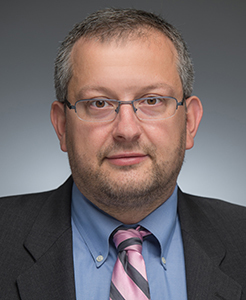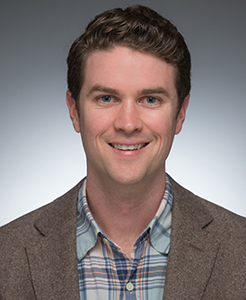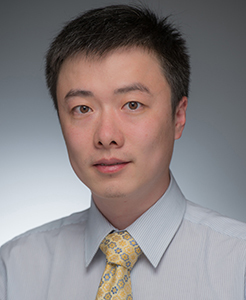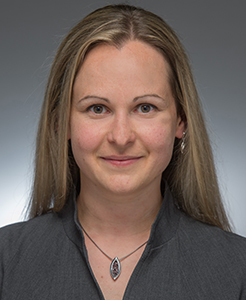The University of Notre Dame’s Department of Economics has deepened its expertise in the areas of business cycles, healthcare, cultural assimilation, and the financial services sector with the recent hires of Ruediger Bachmann, Christopher Cronin, Felix Feng, and Eva Dziadula.
“Hiring quality faculty who support the mission of the university is our number one priority but it is also our most difficult task,” said William Evans, Keough-Hesburgh Professor of Economics and chair of the department. “Economics is a competitive field and most candidates we consider have multiple offers. We are fortunate to have recruited these fine scholars to Notre Dame and we hope to continue our success this year.”
Real-Life Economic Agents

Ruediger Bachmann
Associate Professor Bachmann specializes in the implications of uncertainty and expectation formation on macroeconomic outcomes.
“Rudi’s research is quintessential macroeconomics in that he examines what factors cause and propagate business cycles,” Evans said. For example, in recent years, Bachmann has considered how a firm’s uncertainty about the future impacts its investment patterns.
“Lots of macroeconomists try to better understand how heterogeneity—often inequality—of economic agents matters,” Bachmann said. “As for the expectations part, economists have long, maybe for too long, followed the so-called rational expectations paradigm, which not only assumes that economic agents cannot be systematically fooled, but also that agents in an economic model formed their expectations according to this model, a logical consequence of rational expectations.
“But that led a bit to a neglect of the empirical study of how real-life economic agents form expectations. And this is something the field is trying to catch up with these days.”
Born in Germany, Bachmann’s extensive academic experience started at Yale University’s Ph.D. program and includes full professorships at the RWTH Aachen University and Frankfurt University, as well as visiting professorships at the University of Pennsylvania, Harvard University, and Boston University.
“I was always fascinated by the combination of mathematics and social phenomena, and the historical, political, and philosophical backgrounds that make a good economist,” Bachmann said. “I guess I was also always interested in the bigger, maybe even unanswerable questions, and macroeconomics has a lot of those.”
At Notre Dame, Bachmann joins colleague and Michael P. Grace II Associate Professor Eric Sims, with whom he has coauthored an article that recently appeared in the American Economic Journal: Economic Policy, “Inflation Expectations and Readiness to Spend: Cross-Sectional Evidence.”
“There have been quite a few calls by prominent economists for the Federal Reserve to engineer a bit higher inflation,” Bachmann said. “The thinking goes that higher expected inflation will lead to more consumption and investment now, if the public at large fears higher prices in the future.
“We show, with the help of survey data from the University of Michigan, that this is probably not a good idea. In our best scenarios for this proposal we find that households do not care about inflation when they make purchasing decisions for large items such as furniture, cars, or houses. In the worst scenario, we find that, if anything, people hate inflation and will cut down on spending right away.”
Bachmann, who serves as an associate editor for the Economic Journal, returns to Germany several times a year where he helps guide the career development of young economists as a member of the German Economic Association’s executive committee. He is also a CEPR research affiliate, a CESifo research network fellow, and an external research professor at the Munich-based Ifo Institute.
In the fall, he taught the first half of the first-year Macroeconomics course for Ph.D. candidates; this spring semester he is teaching undergraduate Intermediate Macroeconomics.
“The economics department—and especially the macroeconomics group—at Notre Dame is world-class, and I am happy to be a part of that,” Bachmann said. “I hope that I will help Notre Dame’s visibility abroad, especially in Germany, and maybe open up the recruiting pool for Notre Dame’s Department of Economics, both at the new Ph.D. and the new faculty level.”
Healthcare and Economics

Christopher Cronin
Assistant Professor Christopher Cronin, who comes to Notre Dame from the University of North Carolina, studies applied microeconomics with a focus on health economics.
In his research, Cronin builds and estimates detailed models of how individuals make decisions about healthcare use, said Evans, who also conducts research in health economics. “These models can then be used to simulate how changes in public policy, such as passage of the Affordable Care Act, alters individual behavior.”
Cronin applied a methodological technique called dynamic structural estimation to write a recent paper called “Insurance-Induced Moral Hazard: A Dynamic Model of Within-Year Medical Care Decision Making Under Uncertainty.” In it, he constructed a theoretical model of health insurance and medical care consumption, estimated the model using data from the Medical Care Expenditure Survey, and simulated the model to see how people consume medical care under different health insurance plans.
Cronin’s work shows that a popular research method, which models medical care consumption as an annual expenditure decision, is likely to understate the effect that health insurance has on medical expenditures.
“The goal of policy-makers should be to encourage insurance providers to design plans that efficiently balance risk protection for consumers with the incentive to over-consume medical care,” Cronin said. “Having good estimates of exactly how much more medical care people consume when they acquire insurance is valuable for this pursuit.”
At Notre Dame, Cronin is teaching Intermediate Microeconomics to undergraduates and Econometrics to graduate students.
“The economics department at Notre Dame provides a great research environment with a nice mix of both young and experienced economists who have interests that are similar to my own,” he said.
Financial Services Contracts

Felix Feng
Assistant Professor Felix Feng is a micro theorist whose research focuses on how firms should optimally write contracts to pay executives in the financial services sector—a topic that has received considerable media attention in the past, noted Evans.
“Felix Feng’s expertise in corporate finance will be invaluable as we expand our new undergraduate program in financial economics,” he said.
Feng’s current research topics include how to design compensation contracts to effectively incentivize corporate executives to make good decisions for the firms under their management, and whether compensation contracts look different when the economy is doing well versus when it is in a crisis.
“If so, do the differences make sense?” Feng asked. “That is, do they help the economy recover, or are they problematic and protecting the interest of wealthy executives at the expense of the rest of us? Does the degree to which firms can commit to contracts matter in this context? When contracts cannot be perfectly enforced, how should executives be compensated and what implications does such a compensation scheme have for the economy?”
Feng said he was drawn to the field of economics because it brings together the creative thinking of the humanities and the rigorous logic of the sciences.
“My appreciation for economics continues to grow as I observe how progress in economic research can provide profound guidance for decision making, both at a personal level, increasing the effectiveness of my work, and at the social level, leading to welfare improvement,” he said.
Feng, who hails from Chengdu, China, is teaching Intermediate Microeconomics to undergraduate students.
“During my first visit to campus, I was immediately drawn to the collegiality of my department,” Feng said. “I was also impressed to learn of the support the school and my department has for junior faculty to assist them in their research agendas.”
Immigration and Assimilation

Eva Dziadula
Born and raised in the Czech Republic, with a Ph.D. in economics from the University of Illinois at Chicago, Assistant Professional Specialist Eva Dziadula is working on a project that focuses on identifying cultural assimilation of the foreign born.
“With my coauthor, Ben Ost, we provide evidence suggesting that immigrants culturally assimilate in terms of their preference for sons, which we infer based on reproductive behavior,” she said.
Dziadula, the department’s new undergraduate advisor, received an Oscar Miller Award for teaching excellence at the University of Illinois at Chicago in 2011 and the Elizabeth Bass Award in 2010 for mothers pursuing a doctorate. She also taught at Lake Forest College, where she received her undergraduate degree.
“Eva was a successful instructor at two different institutions,” Evans said. “Her enthusiasm for the discipline is evident in her teaching. Moving forward, she will be a fixture in the introductory micro and macro courses.”
This spring, Dziadula is teaching Principles of Microeconomics and Principles of Macroeconomics.
“Coming from a small liberal arts school and knowing how big of an impact the faculty made in my life, I wanted to be at a place that allows such relationships and provides an environment that supports the students and promotes individual attention,” Dziadula said.
“Notre Dame is the perfect combination of the small liberal arts school accompanied by the perks of a large university.”
Originally published by at al.nd.edu on March 09, 2015.